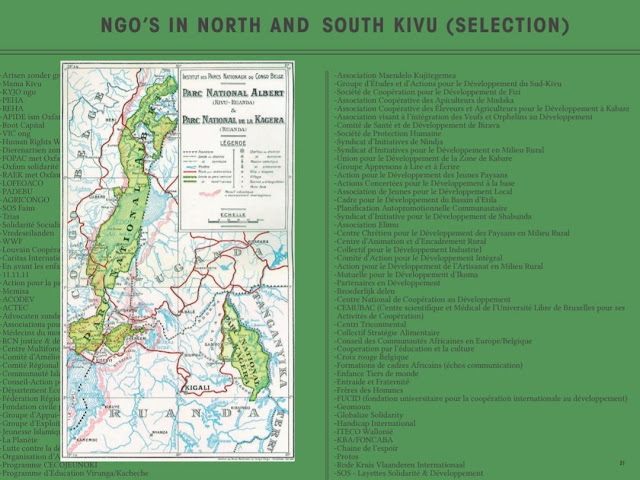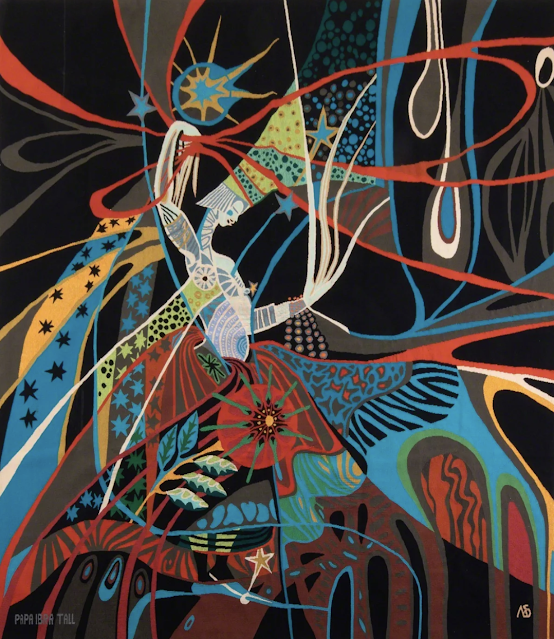Neo-Congo Arrives From The Future
A Hunting Scene, from Sammy Baloji's Hunting and Collecting
Working on both my "A Dance -" readalong and a post about three related books on Malagasy cultures that I think make a compelling basis for a setting, but I've been having an INTRUSIVE (gaming) THOUGHT. I recently read some good advice from the maestro Nick Whelan on how to banish these from their hiding places in your brain:
So that's what I'm doing.
Currently at a crossroads for a thing: I've been running a NooFutra game set in the current day DR Congo. This was another setting that grew out of a triad of books - Rainforest Capitalism: Power and Masculinity in a Congolese Timber Concession by Thomas Hendriks, The Eyes of the World: Mining the Digital Age in the Eastern DR Congo by James Smith, and Health in a Fragile State: Science, Sorcery, and Spirit in the Lower Congo by John Janzen - and it's been so much fun. The main draw of Noofutra imo besides the general traits of Mothership hacks is that it's at least partially a response to the rut that latter-day Shadowrun (and a lot of the genre) has been in, moving away from the sorts of ideas that animated SR in its golden age (Japanese cultural domination, the end result of worker cubiclization, the inhuman uncaring corporation, massive monolithic institutions of control) towards ones that may be more familiar to us (echo chambers on the internet, corporations that try to be human by pretense and manipulation, the difficulty of opting out.) I feel like Untitled Congopunk Game is sort of an extension of that idea, thinking about what capitalism looks like today in DR Congo and growing out from there. I'm being a bit obscure atm since it's still developing, but I'll def talk more about it here in the future. It helps that a lot of classic Shadowrun stuff blends so well, with the amount of magic running through all three books and the connections to the world of tech through artisanal mining for “black metals” required by modern digital technologies.
One kinda nonsense idea I’ve been having is writing up a mock-epic set in the world. There’s an incredible epic tradition in the modern DRC, typically overshadowed by the more famous epics in W. Africa - the Mwindo epic of the Nyanja (made internet-famous by OSP’s retelling), the Lianja epic of the Mongo, the sprawling dynastic cycle of the Luba, which connects to the Ruund culture-heroine Ruwej and the rebel prince epics of the Kanyok. There’s the Axe Years cycle and the tales of the slave-sorcerer-emperor Shyaam told by the Kuba, the Mubila epic of the Lega, the Kudukese epic of the Mbole, and on and on. The issue I’ve been having is how to represent it - there’s very little info available on the prosodic characteristics and I think that doing a translation of a nonexistent poem kinda defeats the purpose. I’ve settled on using the framework of a Western mock-epic, another genre really close to my heart. The Dunciad, Don Juan, MacFlecknoe, Hudibras…it seems a weird marriage at first, but I do feel like there's some elements binding them. Most, maybe all, of the Congolese epics have comedy in their veins, constantly poking fun at heroes and the world they live in even as they sing their praises. As Pende scholar and art historian Zoe Strother explored in Humor and Violence: Seeing Europeans in Central African Art, there's a long history of very sharp, very weird, and very dark comedy in Congolese art: a gallows humor to shame even the most jaded online vet. The imagery and subject matter of the poem are going to be Congolese, both the Central Africa of epic memory and the DR Congo of the 2020s, but the feelings may be most effectively conveyed to a Western audience by the vehicle of quasi-Augustan mock-epic.
(If there's a heaven-feast for artists, I hope Dryden and the unnamed Pende master behind the mocking statue of assassinated Territorial Agent Maximilien Balot** are seated together.)
I developed my own stanza form for the project, modeled (very) loosely on Don Juan. Each stanza is 6 lines, but I added a line break between each 3 - for easy reposting as epigrams in the main project, lmao. The rhymes are mostly hudibrastic. It's iambic, more or less:
4 (A)
4 (A)
3 (B)
4 (B)
4 (c)
3/4/5 (c)
**Please read Art with Fight in It: Discovering that a Statue of a Colonial Officer Is a Power Object from the 1931 Pende Revolt, guys, it's really cool and pretty short for an academic article. I'll send the pee dee eff to anyone who emails if y'all don't have access to it.






Always such a pleasure to read up on your ideas. I love the epic idea, let us know how it develops!
ReplyDeleteThanks, fam! It’s extremely self-indulgent but I figure that comes with the rpg blogger territory.
DeleteI have also been in a headspace lately of trying to think of a modern / recontextualized / novel version of "cyberpunk" / post-cyberpunk / etc.
ReplyDeletePeople tend to uncritically fixate on the aesthetics of the genre in a way that is largely decoupled from what it was supposed to represent, and of course all of the Orientalism, and erasure of the African American influence in particular and Afro-Futurist influences of the genre, so in those respects especially it's cool to see you bringing in that perspective.
I appreciate that you're able to bring in not just like a generic pan-African aesthetic, but are actually meaningfully bringing in a specific cultural identity, while also as we've said previously, not being beholden to the superficial aspects and unafraid to reinterpret it through other frameworks like European Epic- in other words, to take the important cultural influences, while still making it your own, in a way that makes both the cultural and personal influences more meaningful.
Yea I feel you - I think a lot of folks have been developing the same unease with conventional cyberpunk. The aesthetic marriage of Afrofuturism and cyberpunk has always been weird to me, since I’ve always felt like Afrofuturism was an outgrowth of the Black Utopian. I mean, that’s how Mark Dery used it, right? That’s not a dig or an attempt to portray it as naivete, ofc; there’s a wild liberatory energy that runs through things like Butler’s Parable of the Talents or Sun Ra’s work or even Delany’s “ambiguous heterotopia” in Trouble on Titan. For it to be wedded to cyberpunk so often (at least in the creative circles I used to hang around in, god help me) requires cyberpunk to be a ghost or at least toothless, since they work at crossed angles. Maybe, in a best-case scenario, the radical utopianism inherent to Afrofuturist thinking could breathe new life into the hollowed-out shell of cyberpunk…but I feel like that’s cope. Even Afrofuturism, in its most culturally dominant forms, is looking more than a lil empty these days - it’s hard to say that something like Black Panther (either one) contains much of the creative force and power, the “impossible trajectories of Black freedom” you’d find in Octavia Butler or Sun Ra. All just my opinion, obv, I’m not here to yell at some dude who finds stuff like that (idk Shadowrun: Anarchy or BP or whatever) really meaningful.
DeleteOn the form, our previous convo in the comments of the last post helped me settle on my take. For a scholar doing a translation, there’s always gonna be that tension between trying to convey the meaning of a work and trying to convey the feeling of that same work, and I respect the decisions of folks like Biebuyck and Vansina to try and present very orthodox, closely researched translations of the major C. African epic cycles - esp. considering that very little was done in the field since their gen, so the existence of a working academic’s translation has been vital. Tying this to a nonexistent future DR Congo kinda frees you from some of the restraint, more focus on the feeling of the sharper side to something like the Kalala epic or the Mubila epic. In any case, I’d rather have a strange looking work that carries Congolese ideas than throw a new coat of paint on the same goddamn stuff over and over.
Wrt the "hollowness" as you put it, of either cyberpunk or afrofuturism or whatever, this is the inevitable trajectory when a complex, nuanced, or novel set of ideas gets reduced to a series of aesthetics and touchstones; a codified genre.
Delete